Feb. 26, 2024
Hearings by a Committee or Public organisation
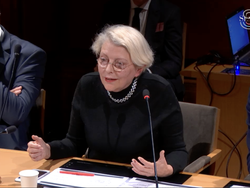
🌐suivre Marie-Anne Frison-Roche sur LinkedIn
🌐s'abonner à la Newsletter MAFR Regulation, Compliance, Law
____

► Référence complète : M.-A. Frison-Roche, "Le juge dans les contentieux de vigilance", participation à la "table ronde sur le devoir de vigilance", audition par la Commission d'enquête du Sénat sur les moyens mobilisés et mobilisables par l'État pour assurer la prise en compte et le respect par le groupe TotalEnergies des obligations climatiques et des orientations de la politique étrangère de la France, 26 février 2024, 16h-17h30
____
____
📺regarder en différé l'ensemble de la table ronde
____
📓lire le rapport de la commission d'enquête du Sénat
____
⚖️ Cette audition a été menée en considération de règles spécifiques à ma situation dans la mesure où d'une part le Droit interdit sous peine de sanction pénale à la personne convoquée de refuser de se présenter et ou d'autre part j'ai immédiatement rappelé au secrétariat de la Commission d'Enquête qu'ayant été Amica Curiae dans le litige opposant les associations Les Amis de la Terre et autres en demande et le groupe TotalEnergie en défense, l'objet du litige portant sur des manquements allégués d'obligations découlant de devoir de vigilance, le statut d'Amica Curiae a conduit pendant cette instance à ne pas connaître le dossier et à continuer de ne pas le connaître pendant une période raisonnable après l'audience du 26 octobre 2022 et le jugement du 28 février 2024 dans le cas dit "Total Ouganda", ce qui conduit nécessairement par application aux règles juridiques et de déontologie à ne pas répondre à certaines questions.
Dans le respect de ces contraintes, il est répondu le mieux possible pour éclairer la Commission d'Enquête.
Cette audition est à mettre en corrélation avec l'audition qui s'est déroulée devant la Commission ... de l'Assemblée Nationale ....
____
► Organisation de la Table Ronde : En accord avec le secrétariat de la Commission d'Enquête, et afin de rendre le plus fructueux possible le premier temps de cette table ronde ayant pour objet Le devoir de vigilance, dans la mesure où il apparaît que dans l'ensemble des auditions programmées, c'est sans doute là où se concentre le plus l'expertise juridique, les 4 intervenants se sont préalablement réunis pour éviter le double écueil soit de traiter deux fois la même chose soit de laisse une dimension du sujet non traité.
Ainsi la première intervenante traite de la façon dont les entreprises élaborent les plans de vigilance, le deuxième intervenant développe la façon dont elles intègrent leur devoir de vigilance dans leur déploiement international, notamment par des mécanismes contractuels, le troisième intervenant expose ce que, dans les contentieux, les demandeurs (qui sont souvent des ONG) allèguent, ce qui m'a conduit en dernier lieu à exposer ce qu'il en est de l'office du juge en la matière.
Il en résulte que mon intervention de 8 minutes aborde plus particulièrement de la question de l'office du juge dans la mise en application du devoir de vigilance.
____
🔲consulter les slides servant de support à cette intervention
____
► Présentation de l'intervention préliminaire : En premier lieu, j'ai souligné qu'en l'état du droit positif, le droit français repose sur le juge puisque la loi pose une Obligation de Vigilance, qui est à la fois une obligation générale et de moyens, l'entreprise devant montrer qu'elle fait ses "meilleurs efforts", cette obligation générale, qui n'est pas limitée à l'environnement, étant déclinée d'une façon particulière par l'entreprise en fonction de ses risques particuliers et de ses engagements propres, notamment contractuels, tandis que le juge applique ce système au cas par cas.
La loi de 2017 a voulu confier ce pouvoir au juge et a voulu un système simple en donnant la seule compétence au seul Tribunal Judiciaire de Paris, ce qui permet d'obtenir une interprétation jurisprudentielle, aussi bien sur les questions procédurales et substantielles, immédiatement unifiée, le dialogue des juges devant être toujours favorisé, tandis que la spécialisation et la formation de ces juges étant un enjeu auquel les juridictions ont répondu concrètement, la Cour d'appel de Paris ayant mis en place une chambre spécialisée, tandis qu'une formation spécialisée sur ces "contentieux systémiques émergents" d'un type nouveau se met en place. Cette spécialisation rend moins impérieuse l'établissement d'une Autorité administrative de supervision.
Cette présence du juge ne doit pas être présentée ni perçue comme pathologique car le procès de vigilance est dans l'ordre des choses, les parties prenantes trouvant une voie d'expression : d'une part plus les entreprises développeront en amont le dialogue et moins il y aura de contentieux et d'autre part le procès lui-même, en continuum, doit favoriser ce dialogue, par le contradictoire et par la médiation.. C'est une part essentielle de l'office du juge qui doit aussi faire respecter le Droit et apporter des solutions à ces enjeux systémiques, la remédiation (plutôt que trancher et sanctionner) étant une voie de son office à développer.
Parce que les juridictions concernées ont su ajuster leur organisation interne et les juges adapter leur office, la généralité de la loi de 2017 permettant précisément cela, la question de l'adoption ou de la non-adoption de la directive CS3D n'étant de ce fait pas un enjeu dramatique parce que le juge est déjà au centre de la vigilance, il convient plutôt de laisser le temps que l'oeuvre de jurisprudence se fasse.
________
Feb. 9, 2024
Conferences
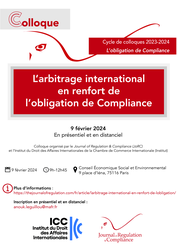
🌐follow Marie-Anne Frison-Roche on LinkedIn
🌐subscribe to the Newsletter MAFR Regulation, Compliance, Law
____
► Full Reference: M.-A. Frison-Roche, "Préalable : ce qu'est l'obligation de Compliance" ("Prerequisite: the Compliance Obligation"), in L. Aynès, M.-A. Frison-Roche, J.-B. Racine and E. Silva-Romero (dir.), L'arbitrage international en renfort de l'obligation de Compliance (International Arbitration in support of the Compliance Obligation), Journal of Regulation & Compliance (JoRC) and Institute of World Business Law of the ICC (Institute), Conseil Économique Social et Environnemental (CESE), Paris, February 9, 2024
____
🧮see the full programme of this event
____
🌐consult on LinkedIn a general presentation of this event, which links to a presentation of each speech (in French)
____
____
🔲see the slides used to support the presentation (in French)
____
🎤see a presentation of the conference "Préalable : ce qu'est un engagement" ("Prerequisite: the Commitment"), given at the same symposium
____
🎤see a presentation of the conference "Le renforcement des engagements de Compliance par le renvoi Ex Ante à l'arbitrage international" ("Reinforcing Compliance commitments by referring Ex Ante to International Arbitration") which was finally not pronounced but will be the subject of an 📝article in the forthcoming book 📘Compliance Obligation
____
► Presentation of the conference: I have first dealt with the very definition of the Compliance Obligation.
After showing that the relationship between Compliance Law and International Arbitration will naturally develop, because the companies subject to it are international, because they contractualise their legal Compliance obligations and because Compliance is being jurisdictionalised📎
This culture of compliance is achieved either through compliance contracts📎
The obligation of Compliance which then takes concrete form consists for the company not in making effective Ex Ante all the regulations which apply to it (conception of conformity which is at once unreasonable, blind and impossible), but in making its best efforts, which it must make visible (see Compliance Evidence System📎
These Monumental Goals are systemic. The aim is to protect systems from collapse (Negative Monumental Goals) or to make them better (Positive Monumental Goals)📎
The role of the Judge, and therefore also that of the Arbitrator, is renewed.
________
🕴️M.-A. Frison-Roche (ed.), 📘Compliance Jurisdictionalisation, 2024.
🕴️M.-A. Frison-Roche, 📝The Judge, the Compliance Obligation and the Company. The Compliance Evidence System, in 🕴️M.-A. Frison-Roche (ed.), 📘Compliance Jurisdictionalisation, 2024.
🕴️M.-A. Frison-Roche, 📝Compliance Monumental Goals, Beating Heart of Compliance Law, in🕴️M.-A. Frison-Roche (ed.), 📘Compliance Monumental Goals, 2023.
Feb. 9, 2024
Conferences

🌐follow Marie-Anne Frison-Roche on LinkedIn
🌐subscribe to the Newsletter MAFR Regulation, Compliance, Law
____
► Full Reference: M.-A. Frison-Roche, "Le renforcement des engagements de Compliance par le renvoi Ex Ante à l'arbitrage international" ("Reinforcing Compliance commitments by referring Ex Ante to International Arbitration"), in L. Aynès, M.-A. Frison-Roche, J.-B. Racine and E. Silva-Romero (dir.), L'arbitrage international en renfort de l'obligation de Compliance (International Arbitration in support of the Compliance Obligation), Journal of Regulation & Compliance (JoRC) and Institute of World Business Law of the ICC (Institute), Conseil Économique Social et Environnemental (CESE), Paris, February 9, 2024
____
🧮see the full programme of this event
____
🌐consult on LinkedIn a general presentation of this event, which links to a presentation of each speech (in French)
____
____
🔲see the slides used to support the presentation (in French)
____
📝This conference and the Working Paper on which it is based are to be linked with the article to be published in the book📘Compliance Obligation
____
🎤see a presentation of the conference "Préalable : ce qu'est l'Obligation de Compliance" ("Prerequisite: what is the Compliance Obligation"), given at the same symposium
____
🎤see a presentation of the conference "Préalable : ce qu'est un engagement" ("Prerequisite: the Commitment"), given at the same symposium
____
► Presentation of the conference: It was initially planned that I would speak on the subject Le renforcement des engagements de Compliance par le renvoi Ex Ante à l'arbitrage international (Reinforcing Compliance commitments through the Ex Ante referral to International Arbitration), but it was agreed with the other organisers of the symposium that after defining the concept of the Compliance Obligation📎
- The inclusion of an offer of arbitration in the field of Compliance implies considering it in a contract as well as in a non-contractual commitment, and studying which category of Compliance Obligation the offer may apply to.
- This insertion benefits from taking the form of a "graduated offer", in a crescendo organised by the company ex ante and offered to the stakeholders: conciliation, mediation and arbitration, in "circles of trust"📎
!footnote-3387 . This is supported by the current French amicable settlement policy. - The result was that I had to prepare a long "preliminary" discussion of what a "commitment" is, without which it seemed difficult to talk in concrete terms about the effective insertion of an offer of arbitration if we did not know whether such links or words had a constraining effect on the person issuing them in relation to the person benefiting from them. After discussions with the other speakers, it became clear that it would be more effective to give a talk devoted solely to the question of the legal definition of commitment. We therefore decided to allocate this second speaking slot to the notion of commitment. Since the written words do not have the same constraints, it will take up the initial construction, insisting on the different supports, either compliance contracts, or associations with compliance clauses, relating to different Compliance obligations, in particular on information or audit or Vigilance📎
!footnote-3388 , because the company must have the legal power corresponding to the mission that the State entrusts to it through Compliance📎!footnote-3389 . - The offer must be carefully drafted to explain its purpose, and its organisation must prove the reality of this purpose: to give access to a judge to people affected by the company's activity, and not to block it.
- This will therefore be available in detail in the forthcoming books:
- M.-A. Frison-Roche (ed.), 📕L'obligation de Compliance
- M.-A. Frison-Roche (ed.), 📘Compliance Obligation
________
🕴️M.-A. Frison-Roche, 🎤Préalable : ce qu'est l'obligation de Compliance (Prerequisite: the Compliance Obligation), in 🧮L'arbitrage international en renfort de l'obligation de Compliance (International Arbitration in support of the Compliance Obligation), 2024.
M.-A. Frison-Roche, Préalable : ce qu'est un engagement
🕴️M.-A. Frison-Roche, 🎤Préalable : ce qu'est un engagement (Prerequisite: the Commitment), in 🧮L'arbitrage international en renfort de l'obligation de Compliance (International Arbitration in support of the Compliance Obligation), 2024.
🕴️M.-A. Frison-Roche, 🚧Compliance and Trust, 2017.
🕴️M.-A. Frison-Roche, 🚧Conceiving Power, 2021.

Feb. 9, 2024
Organization of scientific events

🌐follow Marie-Anne Frison-Roche on LinkedIn
🌐subscribe to the Newsletter MAFR Regulation, Compliance, Law
____
► Full Reference: L. Aynès, M.-A. Frison-Roche, J.-B. Racine and E. Silva-Romero (dir.), L'arbitrage international en renfort de l'obligation de Compliance (International Arbitration in support of the Compliance Obligation), Journal of Regulation & Compliance (JoRC) and Institute of World Business Law of the ICC (Institute), Conseil Économique Social et Environnemental (CESE), Paris, February 9, 2024
____
____
🏗️This symposium takes place in the cycle of symposiums organised by the Journal of Regulation & Compliance (JoRC) and its partners Universities, focusing in 2023-2024 on the general theme of the Compliance Obligation
____
📚The works will then be inserted in the books:
📕L'obligation de Compliance, to be published in the 📚Régulations & Compliance Serie, co-published by the Journal of Regulation & Compliance (JoRC) and Dalloz, published in French.
📘Compliance Obligation, to be published on the 📚Compliance & Regulation Serie, co-published by the Journal of Regulation & Compliance (JoRC) and Dalloz, published in English.
____
► General presentation of the symposium: "Compliance Obligation" appears to be far from International Arbitration if Compliance Law is only understood in terms of binding regulations or even Criminal Law. Arbitration would only have contact with Compliance Obligation in a repulsive way, when a person claims to have enforced a contract before an arbitration court that disregards a compliance prohibition, e.g. corruption or money laundering. It is therefore from a negative angle that the cross-over has taken place.
The fact that Arbitration Law respects the requisite of Criminal Law is nothing new. Moreover, the power of Compliance in its detection and prevention tools, particularly in terms of evidence, no doubt increases the global efficiency.
But Compliance Obligation is based on Monumental Goals, notably linked to global human rights and active ambitions about environment and climate which, particularly in the value chain economy, take the legal form of compliance clauses, or even compliance contracts, or various commitments and plans, which the parties can ask the international arbitrator to enforce. They will do so even more as arbitrators are often the only international, or even global, judges available.
The use they will do of Contract Law, Quasi-Contract Law, Enforcement Law, Tort Law, reinforces Compliance Law in a global dimension.
____
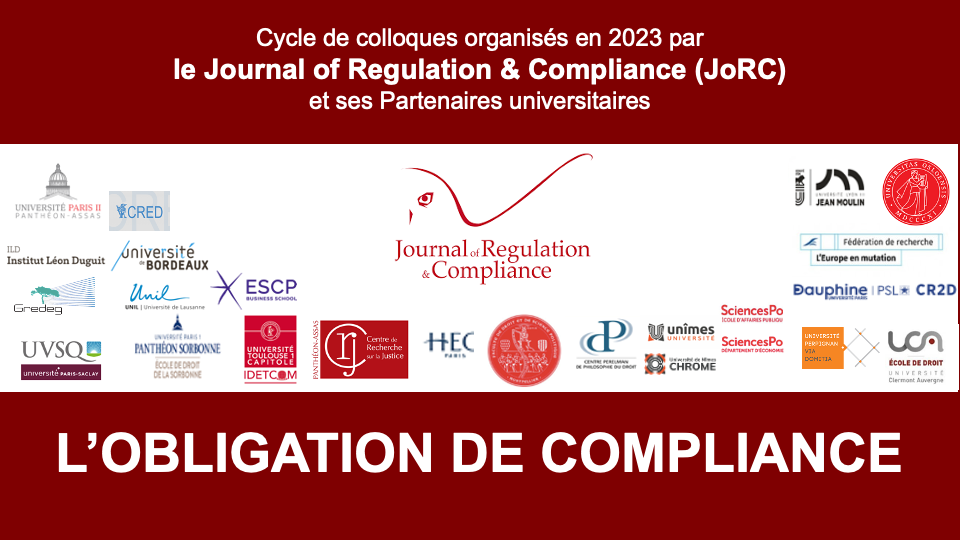
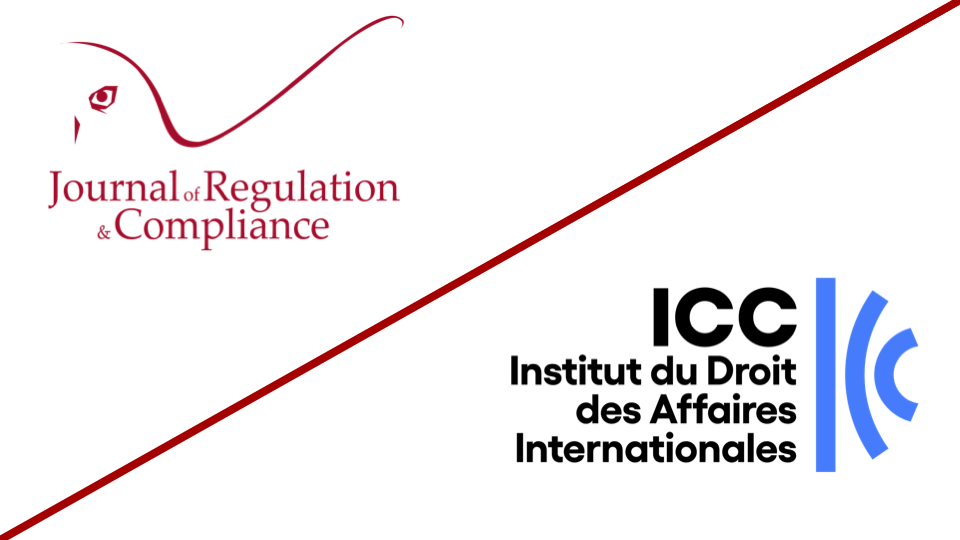
____
► Interviennent :
🎤 Laurent Aynès, emeritus Professor at Paris 1 Panthéon-Sorbonne University, Attorney, Darrois Villey Maillot Brochier (Paris)
🎤 Marie-Anne Frison-Roche, Professor of Regulatory and Compliance Law, Director of the Journal of Regulation & Compliance (JoRC)
🎤 Jean-François Guillemin, former General Secretary of the Bouygues Group
🎤 Christophe Lapp, Attorney, Advant Altana (Paris)
🎤 Jean-Baptiste Racine, Full Professor at Paris Panthéon-Assas University (Paris 2)
🎤 Eduardo Silva-Romero, President of the Institute of World Business Law of the ICC (Institute), Attorney, Wordstone (Paris)
____
🧮Read a detailed presentation of the event below⤵️
Dec. 5, 2023
Conferences
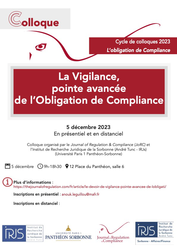
🌐suivre Marie-Anne Frison-Roche sur LinkedIn
🌐s'abonner à la Newsletter MAFR Regulation, Compliance, Law
____
► Référence complète : M.-A. Frison-Roche, "Articulation systémique entre Vigilance, Due Diligence, conformité et Compliance", in M. Mekki, M.-A. Frison-Roche et J.-Ch. Roda (dir.), La vigilance, pointe avancée de l'obligation de Compliance, Journal of Regulation & Compliance (JoRC) et Institut de Recherche Juridique de la Sorbonne (André Tunc - IRJS), Université Paris 1 Panthéon-Sorbonne, 12 place du Panthéon, salle 6, 5 décembre 2023.
____
🧮consulter le programme complet de cette manifestation
____
🚧lire le document de travail bilingue sur la base duquel la conférence a été élaborée
____
consulter les slides accompagnant la conférence
____
► Résumé de la conférence :
____
Cette conférence sera suivie d'un article qui sera publié dans l'ouvrage L'obligation de Compliance.
________

Dec. 5, 2023
Organization of scientific events
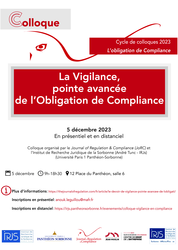
► Référence complète : M.-A. Frison-Roche, M. Mekki et J.-Ch. Roda (dir.), La Vigilance, pointe avancée de l'Obligation de Compliance, Journal of Regulation & Compliance (JoRC), Institut de Recherche Juridique de la Sorbonne (André Tunc - IRJS), Université Paris 1 Panthéon-Sorbonne, 5 décembre 2023.
____
🏗️Ce colloque s'inscrit dans le cycle de colloques organisé par le Journal of Regulation & Compliance (JoRC) et ses Universités partenaires, portant en 2023 sur le thème général de L'Obligation de Compliance.
____
📚Les travaux s'inséreront ensuite dans les ouvrages :
📕L'obligation de Compliance, à paraître dans la collection 📚Régulations & Compliance, coéditée par le Journal of Regulation & Compliance (JoRC) et Dalloz, publié en langue française.
📘Compliance Obligation, à paraître dans la collection 📚Compliance & Regulation, coéditée par le Journal of Regulation & Compliance (JoRC) et Bruylant, publié en langue anglaise.
____
► Présentation générale du colloque : L'Obligation de Vigilance est difficile à cerner à travers la multiplicité des textes et les cas dans lesquels on peut l'appréhender. Cela est particulièrement perceptible à travers le mécanisme de Vigilance qui tout à la fois illustre, voire force le trait, de l'Obligation de Vigilance. A travers les textes internationaux, la loi française et les textes européens adoptés ou en gestation, les contraintes de vigilance, mais aussi les structures et actions mises en place que les entreprises ont organisé ainsi que les actions que les parties prenantes ont engagé, la Vigilance a mis en lumière des aspects de l'Obligation de Compliance, voire a modifié celle-ci.
L'effet de révélation ainsi produit et le mouvement ainsi déclenché, dont les racines sont profondes et les effets systémiques très importants, justifient que l'on cerne davantage des mécanismes qui sont articulés entre eux alors qu'ils sont parfois perçus en silo, ce qui rend difficile la compréhension d'ensemble. De la même façon, parce que la Vigilance est la pointe avancée de l'Obligation de Compliance, l'on peut ainsi mieux distinguer et articuler ce qui relève des spécificités sectorielles, notamment en matière bancaire et financière ou bien en matière numérique, et les articuler avec ce que la Vigilance a, comme la Compliance, de plus général. Plus encore, l'intensité de la Vigilance varie selon les ambitions quelle porte et selon la position de l'entreprise assujettie, ce que traduisent les variations de qualification juridique qui vont du devoir à l'obligation pénalement sanctionnée.
Les différents systèmes juridiques traduisent ces évolutions dans leur loi, leur jurisprudence et la pratique des entreprises et des parties prenantes de façon spécifique car ces différents techniques expriment des normes de comportement et de reddition de comptes dont les exigences probatoires, les conceptions de la responsabilité et les traductions institutionnelles à travers de possibles organes de régulation sont la traduction directe.
En conséquence, le colloque est construit en trois temps. Après une Introduction générale sur les rapports systémiques entre la Vigilance et la Compliance, une première partie porte sur la variation des Intensités de la Vigilance, pointe avancée de la Compliance, une deuxième partie porte sur les Tensions que la Vigilance engendre ou exacerbe, une troisième partie porte sur les Modalités que la Vigilance emprunte dans les systèmes de Compliance.
____

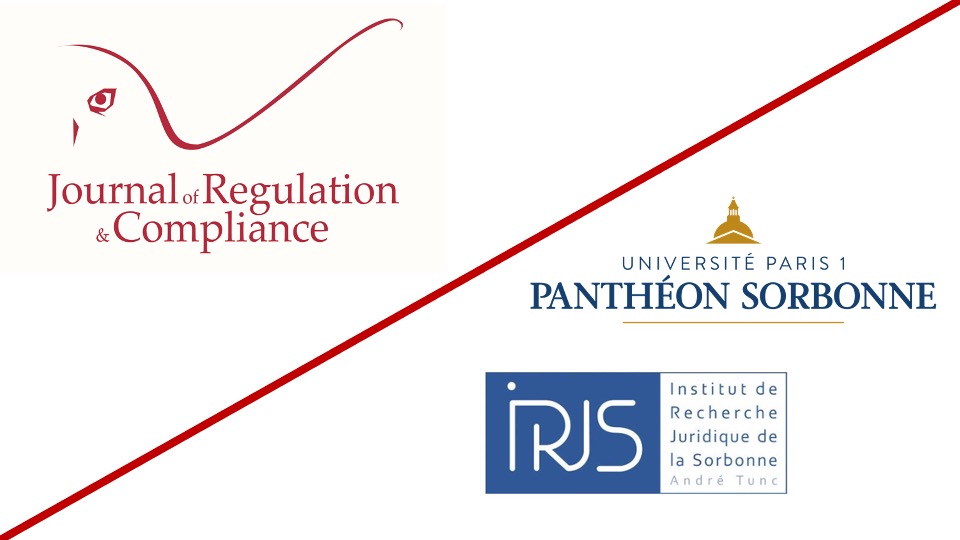
____
► Interviennent :
🎤Laurence Dubin, Professeure à l'Université Paris 1 Panthéon-Sorbonne
🎤Marie-Anne Frison-Roche, Professeure de Droit de la Régulation et de la Compliance, directrice du Journal of Regulation & Compliance (JoRC)
🎤Bernard Haftel, Professeur à l'Université Paris-Nord
🎤Marie Lamoureux, Professeure à Aix-Marseille Université
🎤Grégoire Loiseau, Professeur à l'Université Paris 1 Panthéon-Sorbonne
🎤Véronique Magnier, Professeure à l'Université Paris-Saclay
🎤Gilles J. Martin, Professeur émérite à l'Université Côte d'Azur, membre du Groupe de Recherche en Droit, Économie, Gestion (GREDEG) du CNRS
🎤Mustapha Mekki, Professeur à l'Université Paris 1 Panthéon-Sorbonne
🎤Jean-Christophe Roda, Professeur à l'Université Jean Moulin Lyon 3
🎤Anne-Claire Rouaud, Professeure à l'Université Paris 1 Panthéon-Sorbonne
____
Lire une présentation détaillée de la manifestation ci-dessous⤵️
Oct. 1, 2023
Thesaurus : Doctrine
► Référence complète : J.-C. Roda, "Les obligations environnementales et numériques pesant sur les entreprises : quelle gestion des risques concurrentiels ?", Revue Lamy de la concurrence, n°131, 1er octobre 2023, actualité 4501.
____
► Résumé de l'article (fait par l'auteur) : "Les entreprises cruciales sont aujourd'hui soumises à des obligations de plus en plus lourdes et qui concernent l'environnement et le numérique. Le franchissement de seuils de « taille » oblige désormais ces acteurs à se plier à la logique de la vigilance et de la compliance. De telles obligations ont un impact concurrentiel, surtout si l'on envisage les choses sous l'angle de la concurrence mondialisée. Comment, dès lors, les entreprises concernées peuvent-elles réagir, pour transformer la contrainte en un nouveau départ ? Celui-ci est-il envisageable ? Faut-il faire acte de résilience ou de résistance ?"
____
🦉Cet article est accessible en texte intégral pour les personnes inscrites aux enseignements de la Professeure Marie-Anne Frison-Roche
________
July 15, 2023
Newsletter MAFR - Law, Compliance, Regulation

♾️suivre Marie-Anne Frison-Roche sur LinkedIn
♾️s'abonner à la Newsletter MAFR Regulation, Compliance, Law
____
► Référence complète : M.-A. Frison-Roche, "Compliance & Contrat / lien entre Consentement et Volonté ; enjeu de responsabilité personnelle : CNIL, 15 juin 2023, Criteo", Newsletter MAFR Law, Compliance, Regulation, 15 juillet 2023.
____
📧Lire par abonnement gratuit d'autres news de la Newsletter MAFR - Law, Compliance, Regulation
____
🧱L'obligation légale de Compliance doit être exécutée grâce à des contrats, mais l'on ne peut s'en décharger par des contrats : CNIL, 15 juin 2023, Criteo
____
📧lire l'article ⤵️
July 13, 2023
Thesaurus : Doctrine
► Référence complète : N. Ida, "Contrat et devoir de vigilance des sociétés", JCP E, n° 28, 13 juillet 2023, pp.17-26.
____
► Résumé de l'article (fait par l'auteur) : "Le contrat constitue l’instrument indispensable de déploiement de la vigilance sociale et environnementale dans les « chaînes de valeur » des sociétés donneuses d’ordre. Pourtant, la loi n° 2017-399 du 27 mars 2017 sur le devoir de vigilance des sociétés mères et entreprises donneuses d’ordre n'évoque pas le contrat, dont les liens avec le devoir de vigilance ont en conséquence été peu étudiés. Ce silence étonne car les sociétés concernées ne peuvent exercer leur devoir légal qu’en devenant créancières d’obligations de vigilance au moyen de clauses insérées dans leurs contrats commerciaux. Cette vigilance contractuelle imposée par la loi et bientôt par la directive européenne en cours d’adoption ne pourra atteindre son but qu’à la condition d’adapter les clauses de vigilance aux spécificités des relations contractuelles entretenues avec les fournisseurs et sous-traitants des sociétés donneuses d’ordre.".
____
🦉Cet article est accessible en texte intégral pour les personnes inscrites aux enseignements de la Professeure Marie-Anne Frison-Roche
________
June 7, 2023
Newsletter MAFR - Law, Compliance, Regulation

♾️suivre Marie-Anne Frison-Roche sur LinkedIn
♾️s'abonner à la Newsletter MAFR Regulation, Compliance, Law
____
► Référence complète : M.-A. Frison-Roche, "Message personnel", Newsletter MAFR Law, Compliance, Regulation, 7 juin 2023.
____
📧Lire par abonnement gratuit d'autres news de la Newsletter MAFR - Law, Compliance, Regulation
____
🔴 Message personnel sur la construction du Droit de la Compliance
____
📧lire l'article ⤵️
June 6, 2023
Newsletter MAFR - Law, Compliance, Regulation
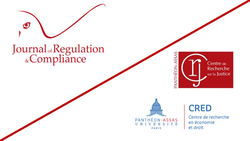
♾️suivre Marie-Anne Frison-Roche sur LinkedIn
♾️s'abonner à la Newsletter MAFR Regulation, Compliance, Law
____
► Référence complète : M.-A. Frison-Roche, "Compliance : obligation, devoir, pouvoir, culture (colloque 13 et 14 juin 2023)", Newsletter MAFR Law, Compliance, Regulation, 6 juin 2023.
____
📧Lire par abonnement gratuit d'autres news de la Newsletter MAFR - Law, Compliance, Regulation
____
🔴 Comprendre l'Obligation de Compliance afin d'en maîtriser la pratique (colloque des 13 et 14 juin 2023 du Journal of Regulation & Compliance (JoRC), du Centre de recherche sur la justice et le règlement des conflits (CRJ) et du Centre de recherche en économie et droit (CRED) de l'Université Paris Panthéon-Assas).
La compliance parait inmaîtrisable dans sa diversité et son ampleur et l'on doute parfois de sa juridicité.
Pour favoriser la maîtrise de cette pratique et construire le Droit de la Compliance, il est essentiel de mieux cerner l'Obligation de compliance.
C'est l'objet de ce colloque.
____
📧lire l'article ⤵️
Sept. 23, 2021
Thesaurus : Doctrine

► Full Reference: S. Schiller, "A single judge in the event of an international breach of compliance obligations?", in M.-A. Frison-Roche (ed.), Compliance Jurisdictionalisation, Journal of Regulation & Compliance (JoRC) and Bruylant, coll. "Compliance & Regulation", to be published.
____
📘read a general presentation of the book, Compliance Jurisdictionalisation, in which this article is published
____
► Summary of the article (done by the Author, translated by the Journal of Regulation & Compliance): Given the very international nature of the topic apprehended, the actors involved and therefore the compliance disputes, it is essential to know if a person can be implicated before several judges, attached to different states or even if he can be condemned by several jurisdictions. The answer is given by the non bis in idem principle, which is the subject of a abondant case law on the basis of Article 4 of Protocol n°7 of the ECHR, clearly inapplicable for jurisdictions emanating from different States.
To assess whether breaches of compliance obligations may be subject to multiple sanctions in different states, it will first be necessary to ascertain whether there is a textual basis to be invoked.
At European level, Article 50 of the Charter of Fundamental Rights now allows the principle of ne bis in idem to be invoked. Applicable to all areas of compliance, it provides very strong protection which covers not only sanctions, but also prosecutions. Like its effects, the scope of Article 50 is very broad. The procedures concerned are those which have a repressive nature, beyond those pronounced by criminal courts in the strict sense, which makes it possible to cover the convictions pronounced by one of the many regulatory authorities competent in matters of compliance.
Internationally, the situation is less clear. Article 14-7 of the International Covenant on Civil and Political Rights may be invoked, if several obstacles are overcome, including the decision of 2 November 1987 of the Human Rights Committee which restricted it to the internal framework, requiring a double conviction by the same State.
Even if these principles are applicable, two specificities of compliance situations risk hampering their application, the first related to the applicable procedural rules, in particular the rules of jurisdiction, the second related to the specificities of the situation.
The application of the non bis in idem rule is only formally accepted with regard to universal jurisdiction and personal jurisdiction, that is to say extraterritorial jurisdiction, which is only part of the jurisdiction. . The Cour de cassation (French Judiciary Supreme Court) confirmed this in the famous so-called “Oil for food” judgment of March 14, 2018. The refusal to recognize this principle as universal, regardless of the jurisdiction rule in question, deprives French companies of a defense. Moreover, the repression of breaches of compliance rules is more and more often resolved through transactional mechanisms. The latter will not always fall within the scope of European and international rules laying down the non bis in idem principle, for lack of being sometimes qualified as "final judgment" under the terms of Article 50 of the Charter of Fundamental Rights of the European Union and Article 14-7 of the International Covenant on Civil and Political Rights.
Breaches in terms of compliance are often based on multiple acts. This results from prescriptions the starting point of which is delayed at the last event and a facilitated jurisdiction for French courts when only one of the constitutive facts is found in France. In terms of compliance, the non bis in idem principle therefore generally does not protect companies and does not prevent them from being sued before the courts of two different countries for the same case. It nevertheless grants them another protection by obliging them to take into account foreign decisions in determining the amount of the penalty. The sanction against Airbus SE in the Judicial Convention of Public Interest (CJIP) of January 29, 2020 is a perfect illustration of this.
Breaches in terms of compliance are often based on multiple acts. This causes delays in the starting point of prescriptions, starting point delayed at the last event, and this facilitates judicial jurisdiction for French courts when only one of the constitutive facts is found in France. In terms of compliance, the non bis in idem principle therefore generally does not protect companies and does not prevent them from being sued before the courts of two different countries for the same case. It nevertheless grants them another protection by obliging them to take into account foreign decisions in determining the amount of the penalty. The sanction against Airbus SE in the Convention judiciaire d'intérêt public -CJIP (French Judicial Convention of Public Interest) of January 29, 2020 is a perfect illustration of this.
____
🦉This article is available in full text to those registered for Professor Marie-Anne Frison-Roche's courses
________